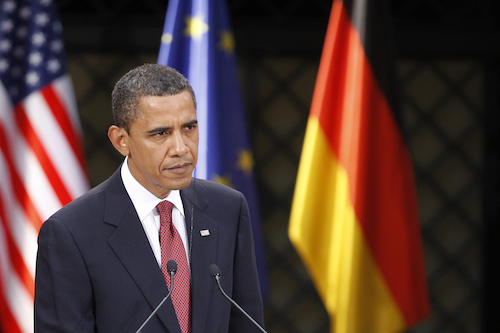The international Left extols the European Union, because they see its “ever-closer union” as the prototype of a supranational government with a centrally planned economy. Former President Barack Obama expressed this sentiment this weekend, saying the EU represented the “pinnacle of human well-being.”
He told an audience in Berlin:
We live in uncertain times. We’re confronted by big questions about how to organize our communities and our countries and the international order. Here in Berlin we have to recognize that this moment is full of contradictions, because Europe in 2019 in some ways has achieved the pinnacle of human well-being. Collectively in Europe right now on average you probably see the highest standards of living of any group of people in the history of the planet. Wealthier, healthier, better educated. The kind that has largely been at peace for 70 years. You have unprecedented information at your fingertips. You can travel freely across borders that once were closed. Our societies have made great strides to … extend opportunity and care for the sick and pursue equality no matter what you look like or how you worship or who you love.
So, you would think that everybody would feel pretty good right now. And yet, what we also know is that powerful forces are threatening to reverse many of these trends. The democratic institutions that helped to bring these about oftentimes have been taken for granted. The planet that we live on is in danger. Some of the contradictions of our economies and how we produce and dispose of goods and services continually now doesn’t appear to be as sustainable, particularly if understandably other parts of the world wanted to achieve the same kinds of standards of living as we have.
President Obama’s reference to “democratic institutions” – an inexact reference to the EU and Brussels’ allied bureaucracies – intended to bolster the institution at a time when Eurocrats are buffeted by an interminable Brexit process and growing populist/nationalist forces in Eastern and Southern Italy.
Praising another nation during a foreign visit is de rigueur, and it is true that global living standards have reached such heights. (Our friends at the Cato Institute measure this regularly through their invaluable website HumanProgress.org.) In fact, life has improved so drastically, organically, that it should call into question the whole notion of economic intervention.
Nonetheless, his statement that the EU-27 represents “the pinnacle of human well-being” is misleading for at least three reasons:
1. The U.S. is far more economically prosperous than Europe. While Europe has a large middle class by its own standards, the average American earns far more money. That is to say, Europe has lower “economic inequality” and a lower standard of living. “In most Western European countries studied, applying the U.S. standard shrinks the middle-class share by about 10 percentage points,” according to the Pew Research Center. The median U.S. income was $60,884 in 2010, while most of Europe clustered in the low-to-mid-40s.
2. Europe is (literally) dying. During a global population boom, Europe’s population is shrinking and greying. Europe’s total fertility rate fell below replacement level in 1975 and has never recovered. Furthermore, European TFR is inflated by the high birthrate of Muslims and migrants. “Europe’s aging non-Muslim population has a fertility rate of just 1.6 children per woman, well below what demographers call ‘replacement-level’ fertility, while Muslims in Europe average a full child more per woman (2.6),” Pew Research found. “Muslims could make up between 11.2% and 14% of Europe’s population in 2050.”
Europe’s native population has imploded so dramatically that Vatican leaders warn the continent faces extinction. “If the West continues in this fatal way, there is a great risk that, due to a lack of birth, it will disappear, invaded by foreigners, just as Rome has been invaded by barbarians,” said Cardinal Robert Sarah recently.
His warning encompasses the United States, as well, although our birthrate hit replacement level as recently as 2008. The U.S. also has dramatically higher levels of religious belief than Europe, from which one may infer the third issue.
3. Europe has no sense of self-identity. While Europe deserves praise for jettisoning narrow ethnic-based identities in the postwar era, its religious disbelief left a void where its self-conception should be. Christianity – the native religion of a region once dubbed “Christendom” – has been removed from EU documents and excised from its self-referential House of European History.
But vapid notions of “European values” are no match for the faith Europe has lost. Again, Cardinal Sarah linked the continent’s studied agnosticism with its demographic twilight. “I want to suggest to Western people that the real cause of this refusal to claim their inheritance and this refusal of fatherhood is the rejection of God,” he said. Simply put, people cannot be happy if they don’t know who they are, and human dignity is inextricably linked to our understanding that we are all the children of God.
These are but a few of modern Europe’s maladies, but they surface the cavernous emptiness that lies at the heart of the human condition, which no measure of living standards can adequately grasp.
(Photo credit: vipflash / Shutterstock.com. Editorial use only.)
